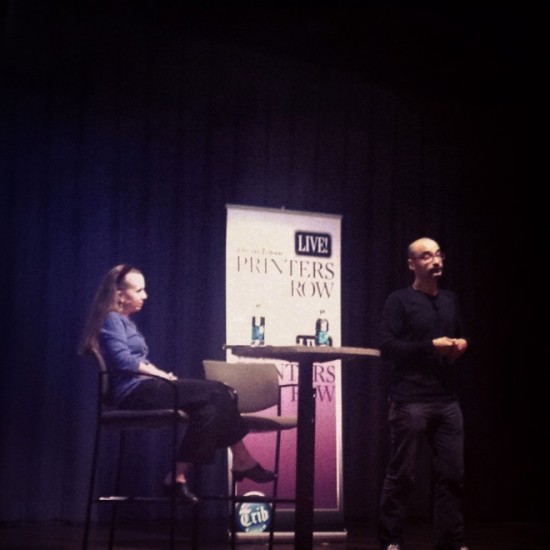When Pulitzer Prize winning author Junot Díaz was in third grade, he was told he was reading at a ninth grade student level. This accelerated ability was a product of the isolation he experienced as as a young kid when he and his parents immigrated from the Dominican Republic to New Jersey. He did not speak English and turned to librarians, “that hallowed subset of teachers” he calls them, who made the effort to try and communicate with him when no one else would. This interaction turned him into a voracious reader and a proud geek.
This is one of the many stories Diaz told the crowd at a packed Chase Auditorium on Wednesday, September 12 in an event hosted by the Chicago Tribune’s Printers Row journal. Still recovering from back surgery, Díaz never took a seat during the hour-long conversation with Chicago Tribune columnist Mary Schmich, at times pacing toward the audience, addressing it directly. Yesterday also marked the release of his new collection of linked short stories titled “This is How You Lose Her.”
In keeping with the subject of his past two books — the collection of short stories, “Drown,” and the novel “The Brief Wondrous Life of Oscar Wao” — “Lose Her” follows Yunior, a young Dominican kid troubled by his unsuccessful search for love and intimacy. The character, Diaz explained, was inspired by his years at Rutgers University and his experiences meeting the “radicalized women” at Douglass College, the women’s residential college at Rutgers. Diaz allows Yunior to address issues of gender, race and identity through his stories. “I engineered him to be perversely honest about the world,” he explained.
Díaz emphasized that through Yunior he is exploring the interiority of men that is hardly explored in popular culture. “There are a lot of contradictions in being a young boy,” he explained. “Vulnerability is not permitted, but boys long for a connection. Sex allows them to be vulnerable without being soft.” Yunior, he said, fails completely at finding connections. Diaz also addressed the tendency for critics to solely focus on the “crotch of his characters.” “Some people think ‘Oh cool, this is a Latino guy writing about sex.’ But there’s so much more beyond that.”
As a product of the public school system, Díaz addressed the teachers in the crowd who were part of the Chicago Teacher’s Union strike. He showed no restraint when expressing his opinion about the faltering state of the U.S. public education system. “It’s fantastically Babylonian the way we’ve set up our society,” he exclaimed. “The goal of the people in power now is to absolutely setup oceanic gulfs between public school students and private school students, so that public school kids never stand a chance. We need to keep holding the line until something gives.”






















